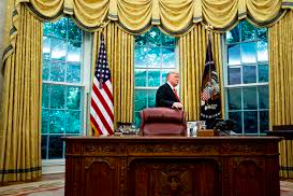By Jeremy Mauser || Staff Writer

Photo courtesy of Erin Schaff / NYT / Redux.
On Sunday, September 8, Secretary of State Mike Pompeo announced that President Donald Trump had ceased peace negotiations with the Taliban, citing the cause as a “[failure] to live up to a series of commitments they had made.” However, despite the result, he suggested that they could still pull American troops from Afghanistan.
President Trump planned a secret meeting at Camp David in Maryland, which would follow months of negotiations that had been going well with Taliban leaders and Ashraf Ghani, the president of Afghanistan. Both parties were close to reaching a potentially-monumental peace agreement that would have ended an 18-year-long war in Afghanistan.
After the announcement, the president tweeted that the Taliban admitted to using a suicide car bomb attack to murder one American soldier and eleven others in Kabul the previous Thursday, thus prompting Trump to cancel the meeting and cease all negotiations.
According to the New York Times, the Afghan government did not favor the potential deal for reasons related to security and Ghani’s upcoming election. The same source also states that the decision surprises many experts on American politics, as Trump promised to withdraw American troops from an 18-year “aimless boondoggle” throughout his campaign and the ceasing of discussions stemmed from the death of one American.
However, the Times states that this was not the sole reason behind the cease talks, as Secretary of State Mike Pompeo and National Security Advisor John R. Bolton debated on the actions that President Trump should take during meetings in the Situation Room. While Pompeo argued that a peace deal would allow them to withdraw troops with an anti-terrorism commitment from the group, Bolton believed they could bring soldiers home without striking a deal with people who have killed Americans.
Following the proposal to bring Afghan and Taliban leaders to Camp David, a disagreement arose in which Trump wanted to finalize the deal on American soil while the other leaders wished to make the Camp David meeting a “celebration” that came after the deal.
After the suicide car bomb attack, Trump made his final decision and, according to an anonymous government official, told aides that “This is off; we can’t do this.”
The public announcement of the proposed peace talks, which had already been cancelled, took many in the administration and public by surprise. The Afghan government placed the blame on the Taliban and the Taliban claimed that the decision would only affect the United States negatively.
Two days after the president’s public disclosure of the failed negotiations, he announced that he had fired Bolton. The national security adviser, the third in Trump’s presidency, had disagreed with the leader on how to work with Afghanistan, Iran, North Korea, Russia, and other nations, thus prompting the firing.
Bolton, who had worked with Trump for 17 months during his presidency, says that he resigned without a push from the commander in chief. Bolton’s former deputy, Charles M. Kupperman, will serve as interim national security adviser until Trump announces an official replacement this week.
Following an eventful week in national politics, it remains clear that Bolton is no longer a top adviser and the war in Afghanistan will continue without an end in sight.
Sophomore Jeremy Mauser is a staff writer. His email is jmauser@fandm.edu.